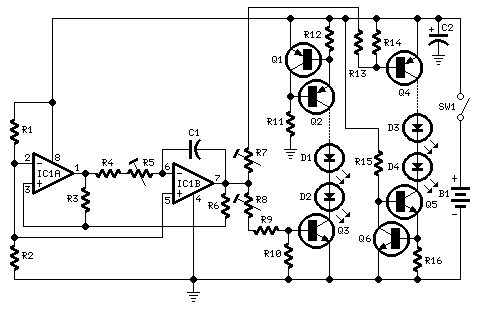
Parts:
R1,R2_______________4K7 1/4W Resistors
R3_________________22K 1/4W Resistor
R4__________________1M 1/4W Resistor (See Notes)
R5__________________2M2 1/4W Carbon Trimmer (See Notes)
R6,R10,R11,R14,R15_10K 1/4W Resistors
R7,R8______________47K 1/4W Carbon Trimmers (See Notes)
R9,R13_____________27K 1/4W Resistors
R12,R16____________56R 1/4W Resistors
C1__________________1΅F 63V Polyester Capacitor
C2________________100΅F 25V Electrolytic Capacitor
D1-D4 etc._________5 or 3mm. LEDs (any type and color) (See Notes)
IC1_______________LM358 Low Power Dual Op-amp
Q1,Q2,Q4__________BC327 45V 800mA PNP Transistors
Q3,Q5,Q6__________BC337 45V 800mA NPN Transistors
SW1________________SPST miniature Slider Switch
B1___________________9V PP3 Battery
Clip for PP3 Battery
Device purpose:
This circuit operates two LED strips in pulsing mode, i.e. one LED strip goes from off state, lights up gradually, then dims gradually, etc. while the other LED strip do the contrary. Each strip can be made up from 2 to 5 LEDs at 9V supply.
Circuit operation:
The two Op-Amps contained into IC1 form a triangular wave generator. The rising and falling voltage obtained at pin #7 of IC1 drives two complementary circuits formed by a 10mA constant current source (Q1, Q2 and Q5, Q6) and driver transistor (Q3 and Q6). R4, R5 & C1 are the timing components: the total period can be varied changing their values. R7 & R8 vary the LEDs brightness.
Notes:
* For those whishing to avoid the use of trimmers, suggested values for a 9V supply are:
R4=3M9, R9 & R13=47K and trimmers replaced by a short.
* Whishing to use a wall-plug transformer-supply instead of a 9V battery, you can supply the circuit at 12V, allowing the use of up to 6 LEDs per strip, or at 15V, allowing the use of up to 7 LEDs per strip.
* In this case, the value of the trimmers R7 & R8 should be changed to 100K.
Source: Electronics Lab
|
